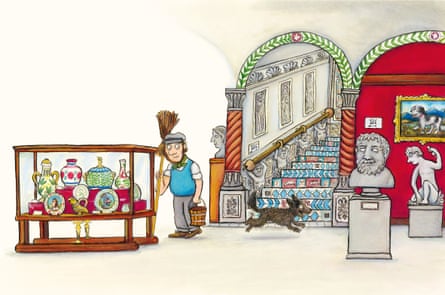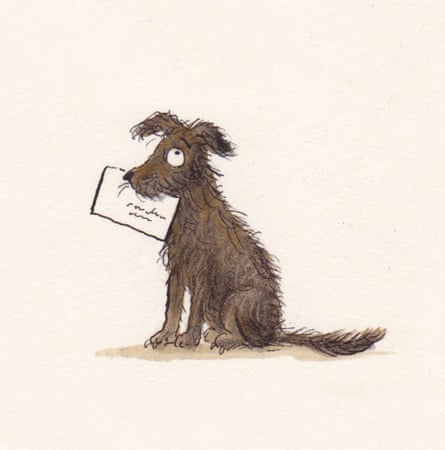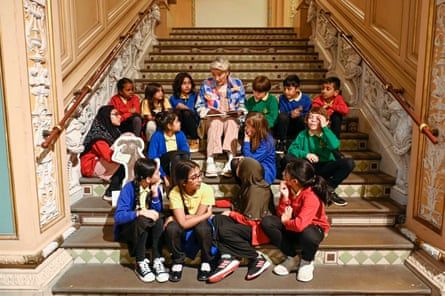Axel Scheffler was an unknown illustrator, working largely for Good Housekeeping magazine, when he received a letter in response to a small exhibition of his work. It was from Emma Thompson, a young actor who had begun to attract attention with TV series such as Fortunes of War and Tutti Frutti. Neatly written in fountain pen, it inquired whether he would accept a commission. “Ken Branagh, my chap, runs his own theatre company,” it explained. He was playing Hamlet to her sister Sophie’s Ophelia and she wanted something to commemorate a moment in time. “I have a vague notion of what you charge for your work, which doesn’t seem to me to be enough,” it went on. “I enclose a picture of Ken and Sophie in case it’s of use.”
Scheffler still has the letter and has brought it along 34 years later to an interview to mark their first literary collaboration, on a children’s picture book, Jim’s Spectacular Christmas. “That’s amazing,” says Thompson of the letter, which predates her six-year marriage to Branagh and was written from the flat they shared in 1988. Then she trumps it, by announcing that she still has the envelope in which Scheffler sent the two pictures. It was decorated with a picture of Hamlet sitting on a skull “looking really depressed” and it sits framed above a loo in her home to this day.
So began a correspondence that continued over the years with requests to Scheffler to design letterheads for both Thompson and her actor mother, Phyllida Law. Though they never actually met in person, they exchanged gifts on the birth of their first children; hers to him was a food hamper; his to her was a picture of a pig wheeling a pram. A pig? Yes, she explains, a pig is her letterhead emblem. When she later became a dame he drew her a picture of a pig wearing a dame badge. “So, without ever meeting, Axel has been part of the illustration of my la-i-ife.” She draws the vowel out into a camp diphthong as part of a running joke with Scheffler as to which of them will seem most exciting to the children for whom their new book is intended: the actor who starred as Nanny McPhee and now as Mrs Trunchbull in the film of Matilda the Musical or the illustrator of the mega-selling Gruffalo books.
We’re sitting in a grand upstairs room at the V&A museum, having skittered along corridors, through porticos and galleries just like the protagonist of their book. He’s a small scruff of a dog named Jim, with a “gamey whiff” and a “rheumy eye”. He’s based on a terrier that was, in real life, the faithful companion of the V&A’s founder and first director, Sir Henry Cole, who left a handy sketch of him and commemorated him with a plaque in the museum. In Thompson’s telling, Jim is rescued from life as a canine chimney brush after tumbling down a flue in a cloud of soot into a gathering of museum worthies. From that inglorious beginning he goes on to become part of the 19th-century invention of Christmas, presenting Queen Victoria with the world’s first commercial Christmas card.
The card, drawn to Cole’s design by his artist friend John Horsley, still exists and copying it has given Scheffler an unprecedented opportunity to depict a child drinking wine: “That’s really not allowed in children’s books,” he points out. Other historical details include the small printing press on which the cards were produced for Cole, an innovator who was also instrumental in introducing the world’s first postage stamp, the penny black. Humorously told and drawn though it is, this is a history book as well as a shaggy dog story – a delicate balancing act that became clear when it came to the portrayal of Queen Victoria, whose chest is being dabbed by her solicitous husband, Albert, to rid it of a tea stain when Jim catches his first glimpse of the royal family. “I thought she was still very young but you describe her as round, so I made her a little bit more – well – round,” says Scheffler.
Thompson, who has always taken her historical research seriously, points out that Victoria would indeed have still been young by 21st-century standards – she was only 42 when Prince Albert died and he is still very much alive in the story – but by that time she was somewhat altered by having given birth to nine children in 17 years. Underpinning Jim’s story is the bigger history of the creation of Albertopolis, the west London museum quarter that was dreamed up by the prince as part of a vision of culture for the masses and is now the home to the Science and National History museums as well as the V&A. “When you start reading about Albert you realise what an incredible bloke he was,” says Thompson. “He was so much more cultured and sophisticated really than our lot are. It was a great tragedy that he died so young, because I think he would have made lots of changes.”

Royal corgis do not come out of it so well: Thompson depicts a stoutly entitled one chasing poor Jim out of the palace. “I just feel as though the corgis might be a bit spoilt,” she says. “But I think actually it’s very likely that the Queen [Elizabeth] was quite fierce with them and that they were very well trained.” This isn’t entirely a matter of conjecture. “I did actually see her do this once. She opened her handbag, in which she had an unwrapped dog biscuit, and when she drew three circles over the head of three corgis they all rolled over. It was like a circus trick, but the thing I really loved was that she had an unwrapped dog biscuit in her handbag. I thought, well, that’s got to make your hankie smell a bit.” This prompts a bit of banter between the duo as to what else she might have kept in her omnipresent bag: carrots for the royal horses, perhaps.
Thompson writes like she talks: irreverent, refreshingly un-grand and with a comic timing that is accentuated in the book by Scheffler’s deployment of mini-tableaux: Jim having a bath, reading a book or slurping up a bowl of custard. The actor was an early connoisseur of comic-book humour, who once wrote a fan letter to the creators of Asterix and received the reply that they were delighted to have made a small English girl laugh. Scheffler, growing up in Germany at around the same time, was a devotee of a comic-strip bear called Petzi, by the Danish husband and wife team Vilhelm and Carla Hansen.

It was Thompson who brought Scheffler in on Jim’s Spectacular Christmas, having already written the story, complete with character sketches, and folded them up into a little book. Though an award-winning screenwriter, she had no ambition to diversify into picture books, she says. But she agreed to this one because it was pitched to her as an invitation from Henry Cole himself, just as the three Peter Rabbit books she has previously written were pitched as invitations from Peter: “There’s still a little bit of me that thinks it was Peter Rabbit himself who asked me,” she says. “I love writing for children. I think it’s perhaps a legacy from dad.” Her sister, Sophie, also now writes books for children. Their father, Eric Thompson, presented the children’s TV programme Play School and went on to create and narrate The Magic Roundabout.
The question is not if, but when, Thompson and Scheffler will collaborate again – they circle around the idea during the interview as if neither can quite believe that the other would actually stoop to it. When time’s up we’re ushered out along the corridors to a staircase that museum staff have identified as the exact one that Scheffler has depicted, where an excited gaggle of east London schoolchildren awaits.
Settling herself on the steps in their midst, beside a large cardboard cut-out of Jim, Thompson asks who has heard of the Gruffalo and a rafter-rattling cheer goes up. Scheffler lurks in the shadows as she starts to read from the book. “Now what,” she asks, “do you think ‘a gamey whiff’ means?”

